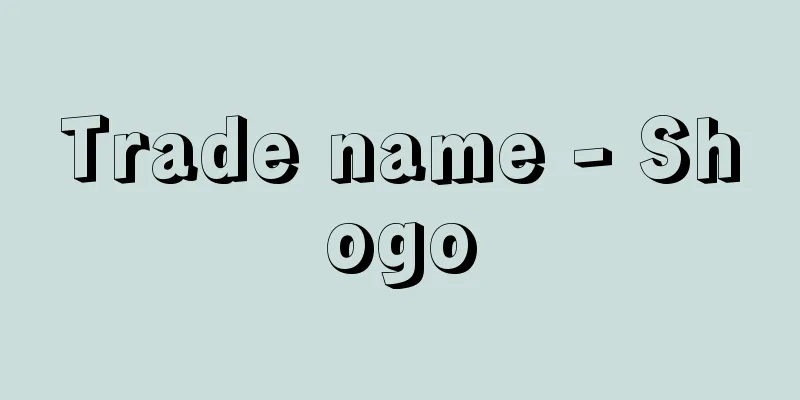Trade name - Shogo

|
A name used by a merchant or company to represent itself in relation to business. It is different from a trademark, which is a symbol that indicates the identity of the type of product that a merchant or company manufactures and sells. "Shogakukan Co., Ltd." is a trade name, and the magazine "Shogaku Ichinensei" is a trademark. A trade name is the name of a merchant or company, so a name used by someone other than the merchant or company is not a trade name, even if it is a shop name. Since a trade name is a name, symbols, signs, figures, etc. cannot be considered trade names. Trade names may be in a foreign language, but case law has stipulated that trade names should be written in Japanese characters. Trade names are used by merchants in relation to business, so they are distinguished from names used in everyday life and pen names or stage names used in specific aspects of life outside of business. Our Commercial Code, from the standpoint of recognizing the traditional trade names as trade names, takes a liberal approach to the selection of trade names in principle, and stipulates that merchants may use their surname, given name or other designation as their trade name (Commercial Code, Article 11). However, since unlimited liberalism in the selection of trade names can have adverse effects, some restrictions are imposed to protect the public and adjust the interests of companies. For example, it is prohibited for a non-company to present itself as if it were a company (Company Law, Article 7), a company must use its name as its trade name (Company Law, Article 6, Paragraph 1), and the characters "Kaisha (stock company)," "Gomei-gaisha (partnership company)," "Goshi-gaisha (limited partnership company)," or "Godo-gaisha (limited liability company)" must be used in the trade name of the company according to its type (Company Law, Article 6, Paragraph 2). In addition, the use of trade names that may be mistaken for other merchants or companies with dishonest purposes is prohibited (Commercial Code, Article 12, Paragraph 1; Company Law, Article 8, Paragraph 1), and furthermore, a company must not use characters in its trade name that may be mistaken for another type of company (Company Law, Article 6, Paragraph 3). A merchant may only have one trade name for one business (the principle of single trade name); in the case of a company, even if it operates several businesses it may only have one trade name; however, in the case of an individual merchant operating several businesses, he or she may select a different trade name for each business. An individual merchant is free to register or not register the trade name, but a company's trade name must be registered (Article 907 of the Companies Act). A trade name registered by another person cannot be registered for the same business if the business office is located at the same place, even if the consent of the registered trade name owner is given. Due to this exclusionary effect of registration, if an application is made for registration of a trade name that is identical or similar to a registered trade name, the registrar must reject it (Commercial Registration Act, Article 24, Paragraph 3). No person may use, with a wrongful purpose, a name or trade name that is likely to cause confusion with another merchant or company. Any merchant or company whose business interests have been infringed or are likely to be infringed as a result of a violation of this law may request that the infringer cease or prevent the infringement (Article 12, Paragraph 2 of the Commercial Code and Article 8, Paragraph 2 of the Companies Act), and may also request compensation for damages. In addition, well-known trade names that are widely recognized in the trade are also protected by the Unfair Competition Prevention Act (Act No. 47 of 1993) regardless of whether they are registered or not (Article 3). The rights that merchants or companies have in their trade names are called trade name rights, which include the right to use them freely without interference from others (right to use a trade name) and the right to exclude anyone who uses a name or trade name that is likely to be mistaken for the trade name for fraudulent purposes (right to exclusively use a trade name), and are recognized regardless of whether or not the trade name is registered (Commercial Code, Article 12, Paragraph 2; Companies Act, Article 8, Paragraph 2; Unfair Competition Prevention Act, Article 3). Trade name rights are rights with a property nature, and therefore can be transferred to others, but since allowing the transfer of a trade name separately from its substance, the business, is likely to lead to misunderstandings among the general public, the Commercial Code provides that a trade name can only be transferred together with the business or when the business is discontinued (Commercial Code, Article 15, Paragraph 1). Furthermore, the transfer of a trade name cannot be asserted against a third party unless it is registered (Commercial Code, Article 15, Paragraph 2). [Toda Shuzo] "Research on Trade Names" by Seinosuke Matsuoka (1999, Senshu University Press) [Reference] | | | |Source: Shogakukan Encyclopedia Nipponica About Encyclopedia Nipponica Information | Legend |
|
商人や会社が営業に関して自己を表すために用いる名称。商人や会社が製造・販売する商品の種類の同一性を表す記号である商標とは異なる。「株式会社小学館」は商号であり、雑誌の「小学一年生」は商標である。商号は商人や会社の名称であるから、そうでない者が用いる名称は屋号であっても商号ではない。商号は名称であるから、記号、符号、図形などは商号とはいえない。商号は外国語でも差し支えないが、判例は、商号は日本文字で表示されるべきものとしている。商号は商人が営業に関して用いるものであるから、一般生活において用いる氏名や、営業外の特定生活において用いる雅号や芸名などと区別される。 わが商法は、従来使用されてきた屋号をそのまま商号として認めようとする立場から、商号の選定について原則として自由主義をとり、商人はその氏、氏名その他の名称をもって商号となすことができると規定している(商法11条)。しかし、商号の選定について自由主義を無制限に認めると、弊害を伴うこともあるので、公衆の保護や企業間の利益の調整のために若干の制限を設けている。たとえば、会社でないものが会社であるかのような表示をすることは禁止され(会社法7条)、会社は、その名称を商号とし(同法6条1項)、会社の商号中には、その種類に従い、株式会社、合名会社、合資会社、合同会社という文字を用いなければならない(同法6条2項)。また、不正の目的をもって、他の商人や会社と誤認されるおそれのある商号の使用が禁止されており(商法12条1項、会社法8条1項)、さらに、会社はその商号中に、他の種類の会社であると誤認されるおそれのある文字を用いてはならない(会社法6条3項)。商人は一個の営業については一個の商号を有することができるだけであり(商号単一の原則)、会社の場合は数個の事業を営む場合でも商号は一個しか有しえないが、個人商人については数個の営業を営む場合、営業ごとに各別の商号を選定することができる。 個人商人の商号は登記すると否とは自由であるが、会社の商号はかならず登記しなければならない(会社法907条)。 他人が登記した商号は、営業所の所在地が同一であるときは、同一の営業のためにはこれを登記できず、たとえ登記した商号権者の同意があっても許されない。この登記排斥力により、登記された商号と同一または類似の商号の登記申請がある場合には、登記官はこれを却下しなければならない(商業登記法24条3号)。 何人(なんぴと)も、不正の目的をもって他の商人や他の会社と誤認させるおそれのある名称または商号を使用してはならず、これに違反することによって営業上の利益を侵害されまたは侵害されるおそれのある商人や会社は、この者に対して、その侵害の停止または予防を請求できる(商法12条2項、会社法8条2項)ほか、損害賠償を請求できる。 なお、取引上広く認識されている著名な商号は、登記の有無にかかわらず不正競争防止法(平成5年法律47号)によっても保護されている(3条)。 商人や会社がその商号について有する権利を商号権といい、その内容は、他人の妨害を受けることなく自由にこれを使用することができる権利(商号使用権)と、不正の目的でこの商号と誤認されるおそれのある名称または商号を使用する者に対して、これを排除する権利(商号専用権)を含み、登記の有無にかかわらず認められている(商法12条2項、会社法8条2項、不正競争防止法3条)。 商号権は財産的性質を有する権利であるから、他人に譲渡できるが、商号をその実体である営業と離れて譲渡することを認めると、とかく一般公衆を誤認させるおそれがあるので、商法は、営業とともにする場合、または営業を廃止する場合に限り商号を譲渡することができるとしている(商法15条1項)。また、商号の譲渡はその登記をしなければ第三者に対抗できない(同法15条2項)。 [戸田修三] 『松岡誠之助著『商号の研究』(1999・専修大学出版局)』 [参照項目] | | | |出典 小学館 日本大百科全書(ニッポニカ)日本大百科全書(ニッポニカ)について 情報 | 凡例 |
Recommend
Beguin - Began (English spelling) Albert Béguin
French critic. Swiss, he was one of the leading f...
Dewa Sanzan - Dewa Sanzan
The three mountains in central Yamagata Prefecture...
Godai Art
During the Five Dynasties (907-960), between the T...
Newfie
...After World War II, Newfoundland decided to jo...
Scrophulariaceae
...The Japanese laurel grows under mountain fores...
Dendroaspis viridis (English spelling) Dendroaspisviridis
… [Takahiro Matsui]. … *Some of the terminology t...
Order to Submit - teishuu meirei
Under the Code of Criminal Procedure, a confiscato...
Northumbrian
…OE is divided into four dialects according to th...
Isoniazid - isoniazid
It is an abbreviation of the chemical name isonia...
Cognome
… The Etruscan influence is believed to have been...
Karatsu Kiln
…At the end of the 16th century, multi-chambered ...
hay itch (English spelling) hayitch
…Sometimes, these pests infest grains and straw, ...
Trier (English spelling)
A city in the state of Rhineland-Palatinate in we...
Arvin, AC - Arvin
…He was born into a clergyman's family, gradu...
Alert - keiho
〘 noun 〙 To warn people to be on alert when danger...








![Gnom (English spelling) [Germany]](/upload/images/67cb6afdbe993.webp)
